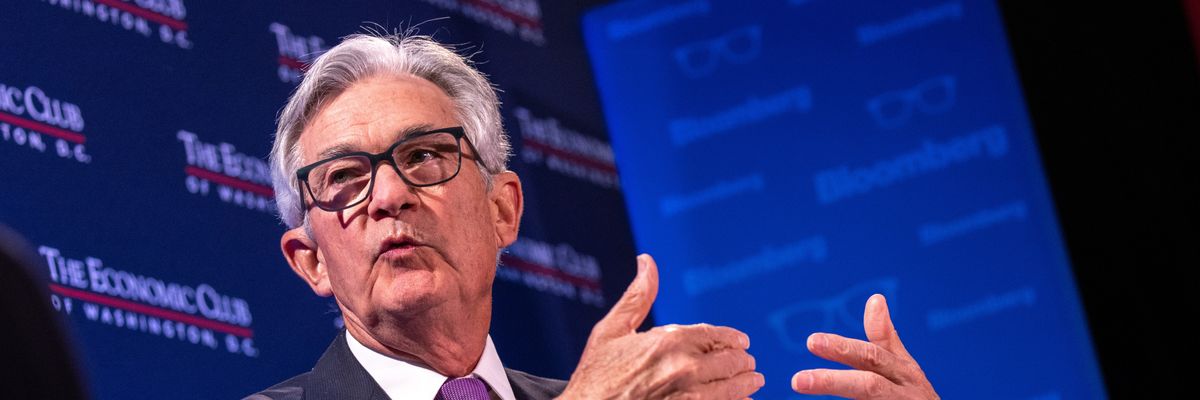Survey data released Monday shows that a majority of U.S. voters want the Federal Reserve to stop raising interest rates before it plunges the economy into recession, a position that aligns with the view of many economists and lawmakers who fear the central bank is on the verge of needlessly throwing millions out of work.
Conducted by Lake Research Partners and published by the Groundwork Collaborative, the new poll found that 56% of U.S. voters believe the Fed should bring its rate hikes to a halt as top central bankers indicate that more increases are coming in the near future—even though rates are already at their highest level in 15 years.
"Our new poll makes it clear that people across the country want the Federal Reserve to stop raising interest rates before it pushes us toward a devastating and completely avoidable recession," said Rakeen Mabud, chief economist at the Groundwork Collaborative.
"People understand that pushing millions of workers out of a job is a terrible way to address inflation and will do nothing to address root causes of inflation like supply-chain interruptions, the war in Ukraine, and big corporations manipulating the market to increase profits," Mabud added. "And they want a Federal Reserve that prioritizes workers and families, not Wall Street and Big Business."
The survey, which reached 1,240 registered voters nationwide, found that just 14% believe the Fed is on the side of "average Americans." Nearly 40% said they feel the central bank serves the interests of big businesses or banks.
"Voters believe overwhelmingly that the Federal Reserve is on the side of Big Business, banks, and Wall Street," Celinda Lake, the president and founder of Lake Research Partners, said during a press call Monday.
The findings were released a day ahead of Federal Reserve Chair Jerome Powell's scheduled appearance before the Senate Banking, Housing, and Urban Affairs Committee, where he will likely face sharp questioning from central bank policy critics such as Sens. Sherrod Brown (D-Ohio) and Elizabeth Warren (D-Mass.).
On Wednesday, Powell is set to testify before the House Financial Services Committee.
The Fed is widely expected to raise interest rates again during its policy meeting later this month, even with inflation easing and despite mounting calls for a pause as previous increases—which are taking a toll on wage growth and the housing market—work their way through the economy.
Powell and other central bankers have repeatedly claimed that the U.S. labor market—which has thus far remained strong in the face of the Fed's rate increases—is running too hot and must be weakened in order to curtail inflation, sparking accusations that the Fed is prioritizing just one side of its dual mandate and "trying to engineer a recession."
The latest U.S. job figures are set to be released on Friday.
Critics have said the Fed's chosen policy approach—aggressive attempts to curb demand—is misguided and will do little to tackle the primary drivers of inflation, including corporate concentration and profit-seeking price increases.
During Monday's press call, economist J.W. Mason argued that "it's absolutely possible for inflation to drop without much job destruction."
"Over the past few months, we've seen a substantial fall in inflation without significant job destruction," said Mason. "You can have disinflation without falling wages and without unemployment. The question is: Are higher interest rates really a tool that can deliver that? I think the answer is no."
The new polling shows that an overwhelming majority of U.S. voters—77%—believe that "we should be focusing on the legislative tools Congress can use to fight inflation instead of simply relying on the Federal Reserve to raise interest rates."
While the survey doesn't mention specific legislative fixes, campaigners and experts have floated a range of proposals over the past year, from a crackdown on Big Oil profiteering to targeted price controls.
Pointing to the public earnings calls of major corporations, Mabud noted Monday that "you don't actually have to look too hard to hear the CEOs being pretty crystal clear that they're jacking up their profit margins by raising prices on consumers."
